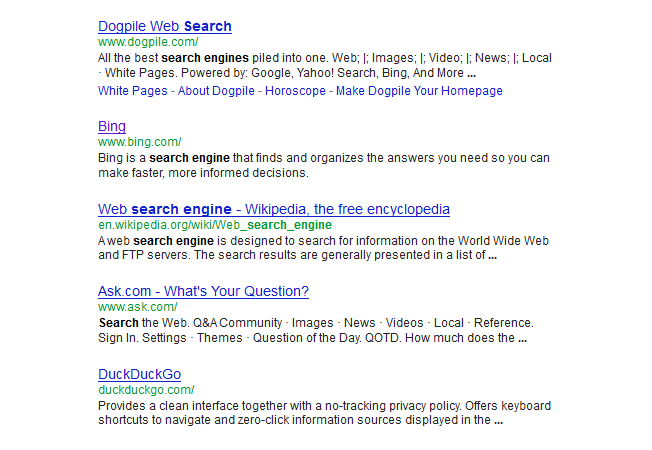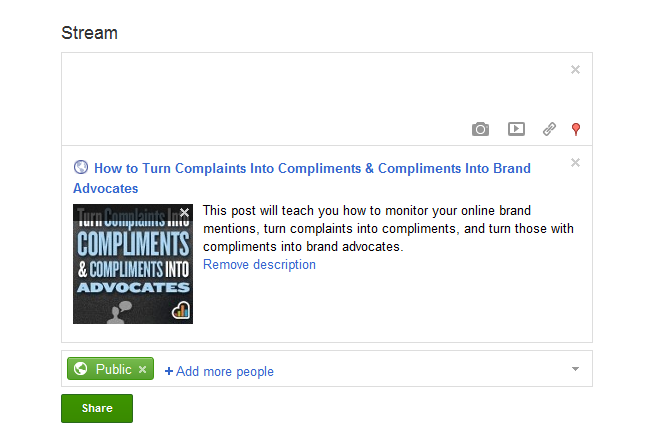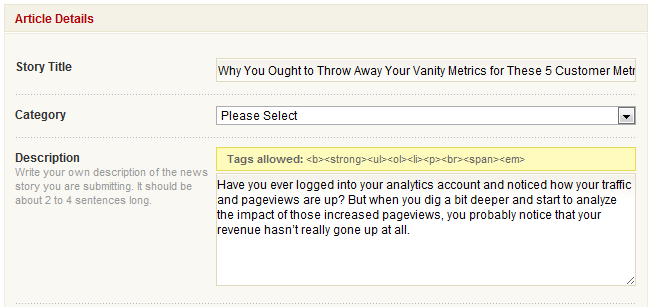Meta Description Role In SEO
The meta description tag in HTML is the 160 character snippet used to summarize a web page’s content. Search engines sometimes use these snippets in search results to let visitors know what a page is about before they click on it. In this post, we will look at how search engines use meta descriptions, what the top SEO blogs say about meta descriptions & whether they still use them, and reasons why you should use them.
How Search Engines Use Meta Descriptions
The best examples of meta descriptions and how search engines use them come from search engines themselves. Let’s look at Google’s own meta description for starters.
<meta name=”description” content=”Search the world’s information, including web pages, images, videos and more. Google has many special features to help you find exactly what you’re looking for.“>
It is exactly 159 characters, including spaces. Google’s meta description is displayed as follows in the top three search engines.
In Google…

In Yahoo…

In Bing…

Ironically, Google doesn’t list themselves in the results when you search “search engine” so you have to search for Google to see it. And they are the only ones that cut off their own description. Although they admit to not always using the meta description as a part of their rankings algorithm, they do still support meta descriptions and include them as snippets in search results.
What the Top SEO Blogs Say About Meta Descriptions
Regardless of whether they count for rankings, the top SEO blogs suggest using meta descriptions. In the Learn SEO series, SEOmoz says…
“Meta description tags, while not important to search engine rankings, are extremely important in gaining user click-through from search engine result pages (SERPs). These short paragraphs are webmasters opportunity to advertise content to searchers and let them know exactly what the given page has with regard to what they’re looking for.”
And in 21 Essential SEO Tips & Techniques, Search Engine Land says…
“The meta description tag won’t help you rank, but it will often appear as the text snippet below your listing, so it should include the relevant keyword(s) and be written so as to encourage searchers to click on your listing.”
The next question you might ask is do the top SEO blogs actually use meta descriptions? The answer is yes and no.
- SEOmoz uses meta descriptions on their homepage and product pages, but not their blog posts.
- Search Engine Land uses a lengthy meta description on their homepage and sometimes uses them on their posts.
- Search Engine Watch uses a lengthy meta description on their homepage, but not on their posts.
- SEOBook doesn’t use a meta description on their homepage or blog posts, but does use it on the occasional internal page.
- Search Engine Journal uses a brief meta description on its homepage but not on its posts.
3 Reasons Why You Should Still Use Meta Descriptions
Most SEO’s might find themselves asking “If meta descriptions don’t count into the rankings algorithm, why should I use them?” The answer to that is simple. Stop thinking about them as a ranking factor, and start thinking about them as a conversion factor. Here are some great reasons to still keep your meta description in mind on your website including your homepage, internal pages, blog posts, and so on.
Reason 1: Bolded Keywords in Search Results
Even if the keyword you use in the meta description doesn’t help in search rankings, it still might help in getting a searchers attention. When someone searches for a particular keyword or phrase, it will be bolded in search results where ever it appears. So if you are targeting that keyword, you will want it to stand out. In this set of results for search engine, which results jump out to you?

It goes to show why your top keyword phrase should be in your SEO title and meta description! You wouldn’t want to be the one result in this list that had no bolded keywords for that search. So be sure your meta description uses the keywords you are targeting and is written in a way that will encourage searchers to click on that result.
Reason 2: Top Social Networks Use It
Whenever you share a page on social networks like Facebook, Google+, or LinkedIn, each site will pull either the meta description or the first sentence or two of the post as the description to show in the share. The meta description will usually be shown in its entirety, while the first sentence or two of your post will end up cut off with ellipsis […]. While you can edit the description for Facebook and LinkedIn, not everyone sharing your page will do so.

Google+, on the other hand, will only let you remove the description.

This means that if your first sentence or two on the page doesn’t sum it up well, people who see the share might miss the point. Hence, if you want your page’s shares to get the most clicks on social media, consider creating a strong meta description that will encourage clicks, just like you would for search results.
Reason 3: Social Bookmarking Networks Use It
Many social bookmarking networks will also use the meta description as a page’s description on their network.

A few examples of networks that do include meta descriptions are: Digg,BizSugar, and My SEO Community. Just about any social bookmarking / voting network built on the Pligg CMS system will also use the meta description first. While you can edit the descriptions on these networks, you can’t count on whether others who submit your pages will. Plus, if you don’t have to edit the descriptions, then you save a little work for yourself if you are submitting your own pages.
How to Include Meta Descriptions on Your Pages
If you are using WordPress on a self-hosted domain, you are in luck. Meta descriptions can be easily added to your content using simple (and free) plugins such as All in One SEO Pack. Just install it, and look on every page / post for the SEO Details box that will ask you for a custom SEO title, meta descriptions, and other information. Your homepage’s SEO details can be added in the plugin’s main settings section. Other themes and platforms may have SEO options built in – if not, do a search for your website’s platform and SEO plugin, add-on, or extension.
Tips for Improving Search Engine Result Click-Throughs
An often neglected value of meta descriptions is the fact that you can craft your descriptions to be calls to action. Here are some tips you can employ when writing your meta descriptions:
- The power is in the language. How you phrase your descriptions can make or break your search engine result. Add words that describe value in your description. Give searchers a good reason to click on your result.
- Write calls to action! Try adding language like “click here”, “learn more by clicking here” and “click on this result”. Obviously the context of the webpage will determine what wording you choose like: “download here”, “view video” etc.
- Test them! – If you have certain landing pages that receive a decent amount of organic traffic, consider testing different variations of meta descriptions to see if you can get a lift in click-throughs. Try different description lengths, phrasing and positioning of your keywords.






If google no more considers, should we use your code and add meta tags for each post manually or should we just put meta description which is already available for each post in blogger.
ReplyDeleteseo training in chennai
adana escort - adıyaman escort - afyon escort - aksaray escort - antalya escort - aydın escort - balıkesir escort - batman escort - bitlis escort - burdur escort - bursa escort - diyarbakır escort - edirne escort - erzurum escort - eskişehir escort - eskişehir escort - eskişehir escort - eskişehir escort - gaziantep escort - gebze escort - giresun escort - hatay escort - ısparta escort - karabük escort - kastamonu escort - kayseri escort - kilis escort - kocaeli escort - konya escort - kütahya escort - malatya escort - manisa escort - maraş escort - mardin escort - mersin escort - muğla escort - niğde escort - ordu escort - osmaniye escort - sakarya escort - samsun escort - siirt escort - sincan escort - tekirdağ escort - tokat escort - uşak escort - van escort - yalova escort - yozgat escort - urfa escort - zonguldak escort
ReplyDelete